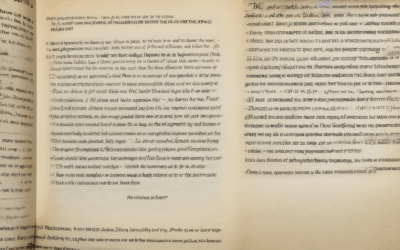Ever wondered about the deeper meaning of your existence? Reflecting on your life’s purpose can feel like a profound journey, one that invites curiosity and introspection. Whether you’re seeking clarity on your role in the world or exploring the essence of your being, understanding your life’s purpose is a quest that many embark upon. This guide delves into the intricacies of self-discovery, offering insights into how to align your actions with your core values and find meaning in life. From examining your beliefs to drawing inspiration from real-life examples, this exploration will guide you through the process of uncovering your true purpose and embracing the richness of your journey.

Exploring My Purpose in Life
Understanding my purpose in life can feel overwhelming, but it’s a journey worth embarking. Here’s a structured approach to help clarify your thoughts and guide you toward discovering your life’s meaning:
- Identify Passions and Interests:** Start by reflecting on what truly excites you. Consider hobbies, skills, or subjects that spark curiosity or joy. These may hint at your purpose.
- Consider Contributions:** Think about how you might want to contribute to the world. This could involve helping others, pursuing a career that impacts society, or dedicating time to a cause you care about.
- Explore Values:** Reflect on core values like kindness, creativity, or learning. Understanding these can provide insight into what drives your actions and decisions.
- Set Goals:** Break down both short-term and long-term objectives. These goals can act as a roadmap, guiding you toward fulfilling your purpose.
- Seek Inspiration:** Look to mentors, role models, or stories of individuals who have found their purpose. Their experiences might offer valuable insights or approaches.
- Engage in Self-Reflection:** Practice mindfulness or journaling to gain deeper understanding of your emotions, motivations, and aspirations.
- Experiment and Explore:** Try new activities or volunteer opportunities to discover what resonates with you. This experimentation can reveal hidden talents or interests.
- Be Patient and Kind:** Understand that finding your purpose is a gradual process. Allow yourself the space to evolve and grow as you uncover your true path.
Remember, your purpose is not static. It may change over time as you grow and circumstances shift. Embrace this journey with curiosity and openness, knowing that each step contributes to your overall well-being and life satisfaction.
How Do You Reflect on What You Want in Life?
Reflecting on what you want in life is a deeply introspective process that requires patience, curiosity, and a willingness to explore your innermost desires. Here are some effective strategies to help guide you through this exercise:
1. Start with Gratitude
Take a moment to appreciate the things you already have. By focusing on gratitude, you’ll gain clarity about what truly matters to you. Consider writing down three things you’re grateful for today—they could be small moments or big achievements.
2. Explore Your Passions
Think about what excites you. Whether it’s a hobby, a career path, or a personal goal, your passions often reveal what you value most. Journaling about these interests can help you uncover hidden motivations.
3. Define Your Values
Values are the foundation of your life’s purpose. Ask yourself questions like, “What principles do I live by?” or “What kind of legacy do I want to leave behind?” Understanding your core values will guide your decisions and help you align your actions with your aspirations.
4. Set Meaningful Goals
Once you know what you value, set goals that reflect those values. Whether it’s personal growth, financial independence, or contributing to your community, having clear objectives gives your life direction and purpose.
5. Practice Mindfulness
Mindfulness helps you connect with your true self. Techniques like meditation or simply taking a few minutes to be present can provide clarity and help you better understand your needs and desires.
6. Seek Feedback
Sometimes others see us differently than we see ourselves. Share your thoughts with trusted friends, family, or mentors who can offer constructive insights. Their perspectives might reveal things you hadn’t considered.
7. Embrace Uncertainty
Life is unpredictable, and what you want may evolve over time. Stay open to change and willing to adjust your goals as circumstances shift. Flexibility is key to finding lasting fulfillment.
Remember, reflecting on your life’s direction doesn’t mean you have all the answers. It’s an ongoing process that helps you grow and adapt. Start small, stay curious, and trust the journey.
For more insights and tools to help you reflect on your life, visit Peter Spirito and explore their resources on personal storytelling and self-discovery.

What Are Some Examples of Purpose in Life?
Life is a journey filled with endless possibilities, and understanding one’s purpose can guide individuals toward fulfillment and meaning. Here are several examples of potential purposes that people may seek:
Purpose 1: Self-Discovery
One of the most profound purposes in life is the quest for self-discovery. Exploring who you are, your talents, and your passions allows you to grow into the best version of yourself. This journey often involves trying new things, learning from others, and reflecting on your experiences.
Purpose 2: Contribution to Others
Many people find their purpose in contributing to the well-being of others. Whether through acts of kindness, professional expertise, or simply being there for loved ones, helping others can create a lasting impact and bring joy to your own life.
Purpose 3: Pursuit of Knowledge
The desire to learn and grow intellectually is a significant driving force in life. Engaging in continuous learning, whether through education, reading, or exploring new skills, fosters personal development and opens up opportunities for future growth.
Purpose 4: Creativity and Expression
Expressing one’s creativity through art, music, writing, or design is another powerful purpose. It allows individuals to share their unique perspectives and inspire others, enriching both their own lives and those around them.
Purpose 5: Service to Society
Some find their purpose in serving society. This could involve dedicating one’s career to a cause, volunteering, or advocating for social change. Such purposes often lead to a sense of accomplishment and contribution to the greater good.
Purpose 6: Building Relationships
Focusing on building strong relationships with family, friends, and community members is a fundamental purpose in life. Meaningful connections foster support, love, and a sense of belonging, enriching daily life.
Purpose 7: Spiritual Growth
For many, purpose lies in spiritual or existential exploration. This might involve seeking answers to life’s big questions, finding inner peace, or connecting with a higher power or universal truth.
Purpose 8: Adventure and Exploration
Embracing life as an adventure allows individuals to continually seek new experiences and challenges. This purpose encourages curiosity, resilience, and a spirit of discovery, keeping life dynamic and exciting.
Purpose 9: Financial Independence
While not always the primary focus, achieving financial independence is a significant purpose for many. It provides stability, security, and the freedom to pursue other aspects of life without financial burdens.
Purpose 10: Legacy and Impact
Leaving a lasting legacy is another example of purpose. This could be through raising compassionate children, creating enduring works, or contributing to advancements that benefit future generations.
Ultimately, the purpose in life is a deeply personal journey. What matters most is aligning one’s actions with their values and aspirations, creating a life that feels meaningful and fulfilling.

What is a Deep Sense of Purpose?
A deep sense of purpose is a profound understanding of one’s reason for existence, often characterized by a strong, meaningful direction in life that drives individuals toward fulfilling goals and contributing positively to the world.
Characteristics of a Deep Sense of Purpose
- Alignment with Values: A deep sense of purpose often stems from core values and beliefs, guiding decisions and actions with intentionality.
- Driving Force: It serves as a powerful motivator, propelling individuals toward achievements that matter deeply to them.
- Contribution to Others: Many find purpose in helping others, whether through service, mentorship, or creating value for society.
- Adaptability: Purpose can evolve over time, shifting and growing as circumstances change while remaining true to one’s core mission.
- Personal Growth: Pursuing purpose often leads to personal development, fostering resilience and a sense of accomplishment.
Discovering Your Purpose
People often discover their purpose through introspection, exploring hobbies, and aligning their actions with their beliefs. Reflecting on past experiences, identifying strengths, and seeking guidance from mentors or communities can also reveal one’s true purpose.
The Impact of Purpose
- Personal Fulfillment: A strong sense of purpose brings joy and satisfaction, enhancing overall well-being.
- Improved Well-being: Those with a clear purpose tend to experience less stress and higher levels of happiness.
- Resilience Building: Purpose provides a framework for overcoming challenges and staying motivated during difficult times.
- Positive Influence: Individuals with a deep sense of purpose often inspire others, creating a ripple effect of positivity.
Cultivating a Deep Sense of Purpose
Reflect regularly on your values and aspirations, set goals that align with your beliefs, surround yourself with supportive individuals, embrace challenges as opportunities for growth, and pursue work or activities that resonate with your soul.
The Three Senses of Purpose
Purpose can be understood in three distinct ways, each offering a unique perspective on its definition and application:
- Competence : This sense of purpose refers to the functional role or service a product or organization provides. It focuses on the immediate goals and outcomes that align with the core offerings.
- Culture : In this context, purpose relates to the underlying values and beliefs that guide the daily operations and decision-making processes within a business or group.
- Cause : Here, purpose extends beyond immediate goals to encompass a broader social or environmental impact. It reflects the aspirations of individuals or organizations to contribute positively to society.
Understanding these three dimensions of purpose allows for a more holistic view of how organizations and individuals define their missions and drive toward achieving their objectives.

What is the Highest Purpose of Life?
The highest purpose of life is often debated across various cultures, philosophies, and belief systems. While opinions may vary, many people seek meaning, fulfillment, and purpose in their existence. Here are some common perspectives:
- Existentialism:** Emphasizes individual freedom and choice. According to existentialist thinkers like Jean-Paul Sartre, the purpose of life is to create it yourself through your actions and decisions.
- Stoicism:** Advocates for living in harmony with nature and accepting the universe’s order. Stoics believe the purpose of life is to achieve inner peace and wisdom through self-control and understanding of the world around them.
- Buddhism:** Teaches that the purpose of life is to achieve enlightenment and escape the cycle of suffering (samsara) through compassion, mindfulness, and understanding of the Four Noble Truths.
- Pursuit of Happiness:** Many people believe the highest purpose of life is to seek and enjoy happiness, whether through relationships, achievements, or personal fulfillment.
Ultimately, the highest purpose of life is subjective and depends on individual beliefs, values, and cultural influences. What gives life its meaning is unique to each person, but exploring these perspectives can help us gain deeper insight into our own lives and the world around us.




0 Comments